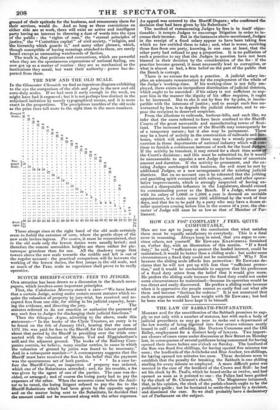SCOTCH SHERIFF-COURTS : FEES TO JUDGES. Om attention has been
drawn to a discussion in the Scotch news- papers, which involves some important principles. First, the Caledonian Mercury stated a case—" We have heard that a certain Judge, acting under certain recent statutes which re- quire the valuation of property by jury-trial, has received and ac- cepted fees from one side, for sitting in his judicial capacity, hear- ing the evidence, and directing the jury. * * The statutes referred to do not sanction or authorize the payment of any such fees to Judges for discharging their judicial functions."
Then the Glasgow Argus, adverting to the above, made this statement—" In the books of the Clyde Trustees, an entry is to be found on the 6th of January 1841, bearing that the sum of 1571. 10s. was paid for fees to the Sheriff, for the labour performed about that period by the Sheriff in presiding over the trials con- nected with the valuation of Messrs. Tod and Higginbotham's mill and the adjacent ground. The books of the Railway Com- panies contain, we believe, many similar entries, in cases in which the valuation of ground by juries was found to be necessary." And in a subsequent number—" A contemporary suggests that the Sheriff must have received the fees in the belief that the payment was the spontaneous act of both parties. * * * In a case be- fore the Sheriff-Court, an inspection of property was ordered, which one of the Substitutes attended ; and, for his trouble, a fee was given by the agent of one of the parties. The case was de- cided, or arranged ; and of course the losing party had to pay the expenses of the other. When the accounts came before the Audi- tor to be taxed, the losing litigant refused to pay the fee to the Sheriff-Substitute which had been given by the opposite agent ; and on the matter being sent to the Substitute, he decided that the amount could not be recovered along with the other expenses.
An appeal was entered to the Sheriff-Depute; who confirmed the decision that had been given by his Substitute." - The method of remunerating Judges by fees is in itself objec- tionable : it tempts Judges to encourage litigation in order to in- crease their income. But in the instances above-mentioned, Judges in the receipt of a fixed salary appear to have been taking fees which no law entitled them to take ; and, what is worse, receiving those fees from one party, knowing, in one case at least, that the other party had refused to pay a proportion. It is no palliation of such a practice to say that the Judges in question have not been biassed in their decision by the consideration of the fee : if the practice become general, it must necessarily lead to corruption, or what is almost as bad, a firm belief on the part of the public that the Bench is corrupt.
There is no excuse for such a practice. A judicial salary im- plies an adequate remuneration for the employment of the whole of the Judge's working-time. If his working-time is not fully em- ployed, there exists an inexpedient distribution of judicial districts, which ought to be amended : if his salary is not sufficient to sup- port him in the manner the dignity of his office requires, it ought to be increased. But to eke it out by fees for by-jobs, is incom- patible with the interests of justice ; and to accept such fees un- warranted by law, is to degrade the judicial character, and to ex- pose the recipient to deserved suspicion. From the allusions to railroads, harbour-bills, and such like, we infer that the cases referred to have been confined to the Sheriff- Courts of the great mercantile and manufacturing towns of Scot- land. The increased business of the Sheriffs may consequently be of a temporary nature ; but it also may be permanent. There may be a burst of activity in the construction of railroads and bar- hours, which will subside ; or there may be a steady pernamenti exertion in those departments of national industry which will con-1 tinue to furnish a continuous increase of work for the local Judges.
If the activity be transient, it may retard for a short time some of the Court's decisions ; and this must be submitted to, for it would
be unreasonable to appoint a new Judge for business of uncertain amount and duration. If the activity be permanent, and the ex- isting Judges surcharged with business, the evil must be met by additional Judges, or a new arrangement of the existing judicial districts. But on no account can it be tolerated that the jobbing and gambling spirit connected with railway, canal, and other specu- lative improvements, which is strongly suspected of having ex- ercised a disreputable influence in the Legislature, should extend its contaminating power to the Bench. If a Judge, whose post with its salary of 1,0001. or 1,3001. a year is deemed an enviable
appointment, is to make some 1601. additional by the work of four days, and that fee to be paid by a party who may have a dozen si- milar-questions coming before him in the course of a year, the cha- racter of Judge will soon be as low as that of Member of Par- liament.


























 Previous page
Previous page